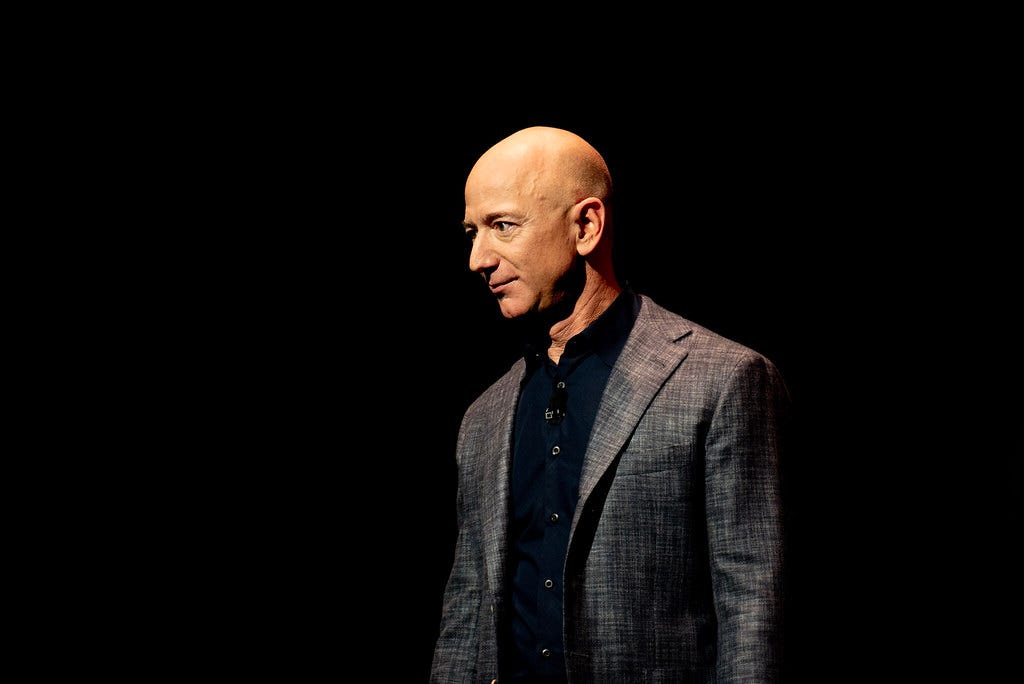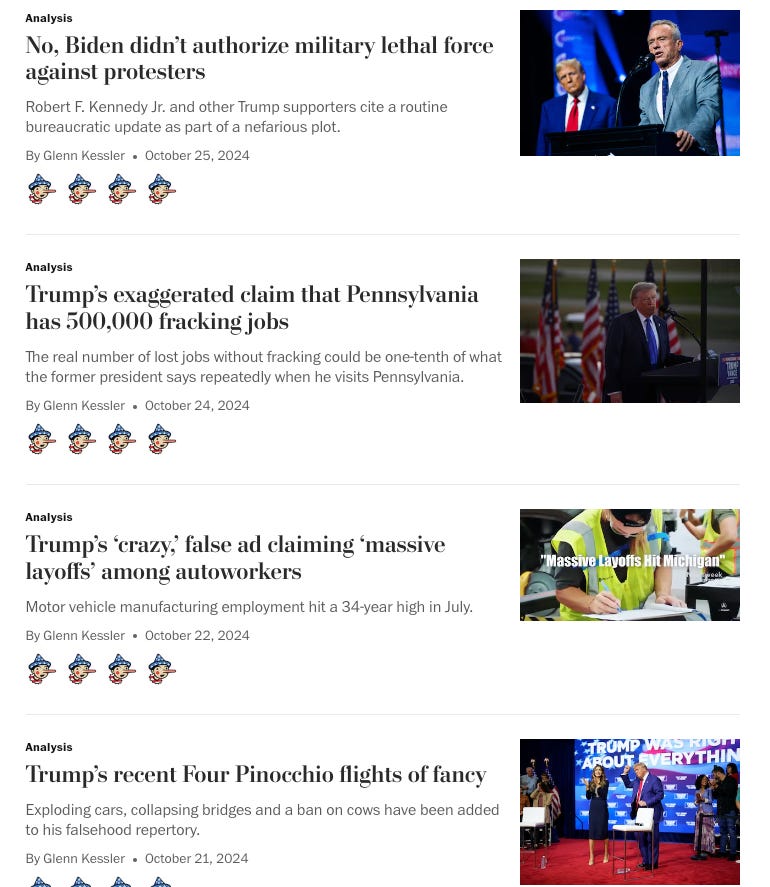A Response to Jeff Bezos from the Fringe
Dear Jeff: You're probably going to have to sell your paper, or kill it. Otherwise, it will take some doing to attract a readership that seeks something other than status or in-group affiliation.
Thanks for your attention, Mr. Bezos. Due to the fact that you own the Washington Post, I admit feeling guilty every time I click Add to Cart at Amazon.com. But I love the business you have built. The many books, of course. The logistics system. The front door service. We even installed a Ring. I send you a chunk of my paycheck each month. I don’t mind helping you be rich. You’ve helped me be rich, too. Still, there has always been that twinge that I was doing something wrong—that, by indulging my gimmes, I was supporting something mendacious and abhorrent.
(Bezos’s words are in ordinary Times text and are taken from his recent oped in the Washington Post. My responses in pull quotes.)
In the annual public surveys about trust and reputation, journalists and the media have regularly fallen near the very bottom, often just above Congress. But in this year’s Gallup poll, we have managed to fall below Congress. Our profession is now the least trusted of all. Something we are doing is clearly not working.
At least I am not alone. I’m glad you see why we feel this way. Whether we’re talking about the Laptop, Russiagate, the government’s extensive COVID and vaccine misinformation/coverups, and a purportedly steep drop in crime, it’s become abundantly clear that traditional media have not only become propaganda peddlers but the so-called fact-checkers are only interested in checking one side—with mixed veracity. Witness:
Anyway, this is just what I pulled up yesterday. Your paper helps us live in what I call a Hall of Mirrors—a reality so distorted it’s hard to see who we are and what we look like, never mind what is true. Democracy, you see, dies in distortion.
Let me give an analogy. Voting machines must meet two requirements. They must count the vote accurately, and people must believe they count the vote accurately. The second requirement is distinct from and just as important as the first.
You’re right. I don’t trust voting machines and don’t believe they count the votes accurately. I can give you myriad reasons for my mistrust—starting with the incentives but including the innumerable anecdotes of ordinary people—but that’s not your point. You were making an analogy. And it is a good one. In service of that analogy, let’s add that newspapers, like voting machines, have given people reasons to be mistrustful.
Likewise with newspapers. We must be accurate, and we must be believed to be accurate. It’s a bitter pill to swallow, but we are failing on the second requirement. Most people believe the media is biased.
It’s not just that people believe the media is biased. It is. Remember when Stephen Colbert got a laugh out of his audience with CNN’s Kaitlan Collins? That show is no bastion of rightwingery. But they see it, just like the scores of thousands that have purportedly unsubscribed from the WaPo because they want you to lie to them. For them, it’s exitus acta probat. Or consider the MSNBC executive, Basel Hamdan, who admitted his job was to be a proxy for the DN— oh, right, this is TV. Fair enough. But we can see that the major networks and news organs are of a piece—captured, corrupt, and partisan.
Anyone who doesn’t see this is paying scant attention to reality, and those who fight reality lose. Reality is an undefeated champion. It would be easy to blame others for our long and continuing fall in credibility (and, therefore, decline in impact), but a victim mentality will not help. Complaining is not a strategy. We must work harder to control what we can control to increase our credibility.
This should be inscribed on every so-called journalist's unemployment check and headstone. Alas, you have hired a generation that lives in lies—that courts the darkness.
Presidential endorsements do nothing to tip the scales of an election. No undecided voters in Pennsylvania are going to say, “I’m going with Newspaper A’s endorsement.” None. What presidential endorsements actually do is create a perception of bias. A perception of non-independence. Ending them is a principled decision, and it’s the right one.
Allow me to be candid on two counts:
First, most of your readership will accuse me of being some sort of MAGA troglodyte. Verily, I don’t adore Donald Trump so much as I loathe the media you acknowledge has lost our trust. Witnessing how deformed and debased it has become makes me look like a partisan, too. So be it. I join dissident leftists such as Michael Schellenberger, Glenn Greenwald, Matt Taibbi, and many others who simply can’t stomach seeing the media operate as tentacles of powerful authorities. Indeed, those in your paper who accuse detractors of being fascists are too comfortable with the unholy alliance between corporations and governments—you know, the definition of fascism. They ally with the censors and the slanderers. And they are a corporation joined at the hip with the state.
Second, this symbolic neutrality—a week before Election Day—is too little too late. Your paper has operated as a partisan organ since you bought it. We’re not stupid. Neither, indeed, are your readers. They just prefer to live in your funhouse.
Eugene Meyer, publisher of The Washington Post from 1933 to 1946, thought the same, and he was right. By itself, declining to endorse presidential candidates is not enough to move us very far up the trust scale, but it’s a meaningful step in the right direction. I wish we had made the change earlier than we did, in a moment further from the election and the emotions around it. That was inadequate planning, and not some intentional strategy.
It’s a start, I grant you. But you, sir, are in something of a pickle. The Washington Post has been summoning egregores for so long that their dark powers have enchanted your readership. *Tell me what I am to believe, oh great entity,* they chant. In exchange, you give them something they love other than the truth. So, you will have a very important time weening them off content that reinforces their priors and makes them feel a part of the elite. To read your organ and recite its talking points signals status and ingroup affiliation—two very powerful drugs. Your readers don’t want the WaPo to be trusted by the unwashed masses. They have only a superficial interest in truth tracking.
I would also like to be clear that no quid pro quo of any kind is at work here. Neither campaign nor candidate was consulted or informed at any level or in any way about this decision. It was made entirely internally. Dave Limp, the chief executive of one of my companies, Blue Origin, met with former president Donald Trump on the day of our announcement. I sighed when I found out, because I knew it would provide ammunition to those who would like to frame this as anything other than a principled decision. But the fact is, I didn’t know about the meeting beforehand. Even Limp didn’t know about it in advance; the meeting was scheduled quickly that morning. There is no connection between it and our decision on presidential endorsements, and any suggestion otherwise is false.
I believe you. I believe you made a principled decision here. But if I had to bet, neither your readership nor your staff, statistically speaking, cares a jot about your principles. Any principles, for that matter. For years, you subsidized Columbia J-school activists, social justice fundamentalists, and cynical sociopaths who are dedicated to serving ideologically aligned power. You start talking of truth and principle, and you’ll throw good money after bad for years trying to turn this ship around when you could be making Blue Origin that much more competitive. Then again, I guess the WaPo is a drop in the bucket for you, despite the considerable losses.
When it comes to the appearance of conflict, I am not an ideal owner of The Post. Every day, somewhere, some Amazon executive or Blue Origin executive or someone from the other philanthropies and companies I own or invest in is meeting with government officials. I once wrote that The Post is a “complexifier” for me. It is, but it turns out I’m also a complexifier for The Post.
I can see that. Maybe you should just sell it or kill it. Not that you care, but my preference would be the latter. I admit I’m biased. I worry a Soros, a Murdoch, or some other execrable sort with decidedly fewer scruples would come by and scoop it up to command an army of crybullies. They will only add more pollution to the information ecology. So, if you’re thinking about selling it, remember your principles in the transaction, too. Otherwise, it’s important to listen when the principle says to let things die. Indeed, it’s important to know when mercifully to kill.
You can see my wealth and business interests as a bulwark against intimidation, or you can see them as a web of conflicting interests. Only my own principles can tip the balance from one to the other. I assure you that my views here are, in fact, principled, and I believe my track record as owner of The Post since 2013 backs this up. You are of course free to make your own determination, but I challenge you to find one instance in those 11 years where I have prevailed upon anyone at The Post in favor of my own interests. It hasn’t happened.
It’s funny. Much of your readership hates billionaires. They only grudgingly accept your ownership because, up to this point, you have been so… permissive. They will undoubtedly choose to see you as ingratiating yourself to what might well be the next Trump Administration—with your arch-rival in the space race right at the center of the action. Still, I believe you. And assuming you are to be believed, I still hold that many of your readers and writers will greet your admonitions like ticks and leaches greet lighters. I don’t envy you as you try to figure out how best to move forward.
Lack of credibility isn’t unique to The Post. Our brethren newspapers have the same issue. And it’s a problem not only for media, but also for the nation. Many people are turning to off-the-cuff podcasts, inaccurate social media posts and other unverified news sources, which can quickly spread misinformation and deepen divisions.
As an occasional off-the-cuff podcaster, social media poster, and news source with sometimes a bizarre and questionable slant, I can tell you that we indie sources turn to each other in this Hall of Mirrors because we trust each other more than power’s papers and programs. In the process, the best of us learn to use a Bayesian form of Coherence Theory and operate with steadily improving discernment. Sure, we see a lot of Dreck and Dross. Sometimes we are duped by it. But at least Dreck and Dross don’t hide behind laurels long unburnished by integrity and professionalism. Indeed, the more we operate in our imperfect peer networks—rather than worshipping in the Blue Church—we start to see the contours, at least, of the true, the beautiful, and the good.
The Washington Post and the New York Times win prizes, but increasingly we talk only to a certain elite. More and more, we talk to ourselves. (It wasn’t always this way — in the 1990s we achieved 80 percent household penetration in the D.C. metro area.)
It’s not easy to look up someone’s nose as they look down on you, particularly as such lofty heights are gained by being a member of a bubble and swearing fealty to its shibboleths. It will be tough to attract the unwashed masses when it looks like the bubble only wants to wash us away.
While I do not and will not push my personal interest, I will also not allow this paper to stay on autopilot and fade into irrelevance — overtaken by unresearched podcasts and social media barbs — not without a fight. It’s too important. The stakes are too high.
Respectfully, I assume “the stakes” are our collective intelligence, which grows healthy and whole the more we track the truth. And we—at least I—applaud you for your willingness to pay truth trackers while obliquely admitting that your publishers have spent too much of your largesse mixing truths, falsehoods, and dubious narrative elements. Still, I suggest you temper your skepticism of podcasters and mute your credulity about well-paid reporters with research tools. Right now, a generation of journalists, far from tracking truth, are using such tools to architect politically expedient alternatives to reality. As a businessman, you know you’ll get more of an activity if you subsidize it.
Now more than ever the world needs a credible, trusted, independent voice, and where better for that voice to originate than the capital city of the most important country in the world? To win this fight, we will have to exercise new muscles. Some changes will be a return to the past, and some will be new inventions.
Indeed. Here’s an invention idea that could help us improve our sensemaking:
Criticism will be part and parcel of anything new, of course. This is the way of the world. None of this will be easy, but it will be worth it. I am so grateful to be part of this endeavor. Many of the finest journalists you’ll find anywhere work at The Washington Post, and they work painstakingly every day to get to the truth. They deserve to be believed.
They will deserve our belief when a critical mass writes things worth believing.







I made a rare visit to Facebook yesterday (to let people know about a new blog post) and made the mistake of reading the first couple of items. One was from a scientist whose work I respect. He was blaring out to his people that he had cancelled his WaPo subscriptions. How stupid, I thought. What for? It's not going to hurt Bezos. It may well hurt the loathsome reporters and staff at the paper who share his distorted views. I wonder if he also supports political endorsements from Nature and Science -- another two publications that have lost much credibility.
Bezos can fly a new flag on his battleship the SS Washington Post, but I will be shocked if he modifies its ideological direction one degree. If Trump wins I suspect the campaign to bring Trump down will start the next day, confirming that speculation. At the very least the WP will begin preparing the DNC battlespace for 2028. The paper belongs to the Blob, not Bezos.